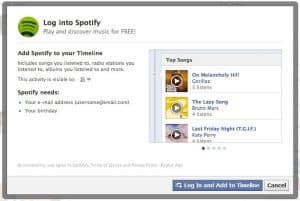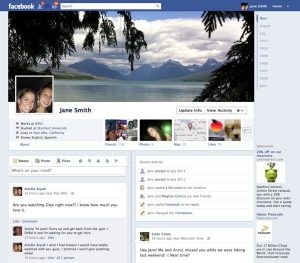
Yep, get ready to take “oversharing” to a whole new level.
Now, just to be clear, the impending changes to your Facebook profile page won’t land in your account for a few weeks, although several related new features—like that floating “ticker” that appeared on the Facebook home page a few days ago—are already here.
But the changes, once they do arrive, will be fairly significant. In place of the linear “wall” of activity on your current Facebook profile will appear a jumbo-sized “cover photo” that you can use to … well, “express who you are,” as Facebook CEO Mark Zuckerberg puts it. The cover photo could be a snapshot from a recent vacation, or a picture of your dogs, or your tykes in their Halloween costumes; think of it as the wallpaper on your PC desktop.
Also new will be a series of thumbnailed tiles for letting visitors view your Facebook friends, your most recent photos, a map of everywhere you’ve been, and a compendium of your various “likes.”
Most importantly, though, there’s the new, appropriately named “Timeline,” which will let your Facebook pals browse your shared photos, links, videos, and stories through the years, with summaries and “trends” of your activity posted at the top of the page.
Make no mistake, Facebook has big plans for your Timeline. Instead of just collecting the content you’ve actively shared with your friends, your Timeline can also show the world (depending on your comfort level, of course) what you’re listening to on Spotify, what you just watched on Hulu, and how many laps you did around the park last week.
How so? With the help of a new series of applications that can share what you’re doing, once you’ve given them the go-ahead.
Using a new behind-the-scenes architecture dubbed “Open Graph,” this new “class” of apps (like, for instance, Spotify for music, or Hulu for TV shows) will ask you once—and only once—for permission to access your activity and publish to your Timeline.
Grant that permission to Spotify, for example, and your friends will be able to see what you’ve been listening to on Spotify—or indeed, the song you’re playing right now—automatically, with updates appearing in your Timeline and on that new “ticker” on the Facebook home page.
Not only that, but your friends will be able to listen or watch (in the case of Hulu or, soon enough, Netflix) along with you. All they’ll have to do is click an item in your Timeline or in the ticker—which might read, for example, “Ben is listening to Born to Run on Spotify”—and click a button to sample what you’ve been playing.

A new breed of Facebook apps will only ask once before they start sharing all your activity with the world.
The same principle will apply to games, too. Take “Words with Friends,” the Scrabble-like social game that you can play on Facebook. With the new “open graph” system, your friends might be able to see that you just got a triple-word score in a game—and they’ll even be able to see an image of the board, complete with your brilliant 78-point Words with Friends move.
These new “open graph” applications will also extend to news sites, letting your friends see each and every story you’ve read on, say Yahoo! News or The Huffington Post, while a new series of “lifestyle” apps will let the world track the latest recipes you’ve tried, or the milestones you’ve hit in your fitness regimen.
“Real-time serendipity” is how Mark Zuckerberg is describing Facebook’s new, wide-ranging sharing philosophy, noting that these new social apps will make it even easier for users to find more music to buy, more movies to watch, and more stories to read, all thanks to the “passive” suggestions of their Facebook friends.
Of course, another way of looking at Facebook’s new Timeline is as the ultimate example of an “overshare”—in other words, exposing everyone in your world to (almost) everything you do online.
Now, I should point out that the items in your Timeline will be subject to the same privacy controls that govern the rest of Facebook; you can share all your activity with everyone or just some of it, or you can allow only your friends or just you to browse your every last click.
Also, this new breed of social apps from the likes of Spotify, Hulu, Netflix, and Yahoo! won’t share anything unless you give them permission to first—although once you do, the sharing will begin without any more prompting.
So, what do you think? Looking forward to sharing what you’re watching, reading, and listening to on Facebook—and seeing what your friends are enjoying, as well? Or is Facebook taking this whole “real-time serendipity” thing a bit too far?

